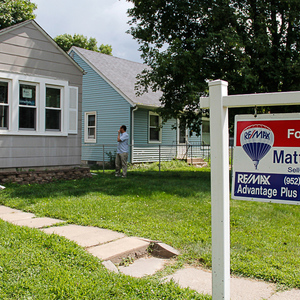
A Massachusetts lawmaker has introduced a bill that would require an energy assessment and an energy performance label for all single-family homes when they are put up for sale.
The bill, S. 1983, was introduced by Senator Eric P. Lesser and has been referred to committee, the senator’s communications director, Ryan Migeed, said.
Although several cities around the U.S. have similar requirements, Massachusetts would apparently become the first state to make a disclosure about energy performance a condition of sale. A similar requirement was included as an amendment to an energy bill the Massachusetts Senate considered last year, but it was eventually dropped as the bill moved forward. This time, Migeed said, the measure was proposed as stand-alone legislation on its own merits.
“We still think it’s a good idea,” he said, referring to the proposed label as a “Kelley Blue book for houses.”
In addition to single-family homes, the requirement also would apply to sellers of multifamily houses of fewer than five units as well as anyone selling a condominium. The real estate agent handling the listing would be required to disclose results of the assessment and energy performance label before a sales contract was signed.
There are a number of exceptions. Among them are sales to family members, houses that have had an energy assessment within the last three years through the Mass Save program, and houses built in the last three years that comply with the most recent energy codes.
The bill isn’t specific about the assessment or the performance label but would require the state’s Department of Energy Resources to design both.
The bill reads in part: “The energy assessment shall consider, but not be limited to, information regarding annual energy consumption, energy costs for electricity and thermal needs, a home’s envelope, including the foundation, roof, walls, insulation and windows, and heating, cooling, and hot water systems, and annual carbon emissions.”
The requirement would go into effect no later than June 30, 2021 or nine months after the bill enacted, whichever is later.
As written, the bill doesn’t explain who would pay for the energy assessment. However, Casey Bowers, legislative director at the Environmental League of Massachusetts, said in a telephone call the intent is to make the assessments free for homeowners.
Bowers said the work would likely take place under the umbrella of Mass Save, an existing energy efficiency program that offers energy audits to homeowners at no cost as well as a variety of rebate and incentives for home improvements and appliance upgrades.
The plan had good momentum last year, she said, adding, “Hopefully this is the year.”
Realtors’ group opposes the plan
While a proponent of Mass Save in general, the Massachusetts Association of Realtors (MAR) opposes a mandatory energy assessment, communications director Eric Berman said.
The assessment and labeling requirement would add to the time it takes to sell a home, potentially putting sellers at a disadvantage, and homeowners who could not afford to make energy upgrades on low-scoring homes could see reduced equity in their properties, he said.
In a written statement, the realtors’ group said that policies that protect the environment are important, but they “must not arbitrarily restrict or infringe upon private property rights.”
MAR said that Massachusetts has some of the oldest housing stock in the country. Older houses are not as energy-efficient as newer ones, and many of older homes are located in less affluent areas where homeowners often don’t have the resources to make upgrades.
In addition, the association said, existing state law requires home inspectors to give home buyers a document that explains the benefits of a home energy audit. Standard purchase agreements also include a provision allowing the buyer to conduct an energy audit as part of a home inspection.
“Legislative or regulatory requirements that interfere with the flow and valuation of the real estate marketplace can wreak havoc on one of Massachusetts most important economic engines — real estate transactions,” the statement said.
The American Council for an Energy-Efficient Economy says that mandatory energy ratings and disclosures are becoming more common. Policies requiring disclosures about energy use for commercial buildings are in place in nine large U.S. cities and one county, ACEEE says, while requirements for residential properties are “less common and less uniform.”
“Residential energy rating and disclosure is a promising low-cost policy option that can help increase consumer transparency about the costs associated with operating a home, promoting more sound purchasing decisions in a post-mortgage crisis environment,” ACEEE says in a guide for policy makers posted at its website.
Bowers said that concerns by realtors that mandatory energy assessments would slow sales are probably misplaced. It’s especially important for low-income buyers to know exactly how much money they would be spending on energy, she said. “People appreciate knowing what they’re getting into,” she said, “good or bad.”
Minneapolis adopts a similar plan
Earlier this year, the city of Minneapolis approved a plan that will require the energy efficiency characteristics of houses to be disclosed when sellers put their properties on the market. Starting next year, information on insulation, the heating system, and windows will be added to a Truth in Sale of Housing report that is already required.
At the same time, the City Council approved a requirement that residential building owners disclose the average energy cost per square foot to renters. That requirement takes effect in 2021.
According to the city, the new policies are designed to reduce overall housing costs and make sure than homeowners and renters have reliable information on energy costs when they decide where to live.
Real estate agents didn’t like it, particularly a provision that requires an inspector to drill a hole in an exterior wall in houses built before 1980 to check insulation levels.
Minneapolis became one of several U.S. cities to require energy disclosures, including Austin, Texas; Berkeley, California; Chicago, Illinois; and Portland, Oregon.
Weekly Newsletter
Get building science and energy efficiency advice, plus special offers, in your inbox.















14 Comments
Requiring a seller to submit three years of energy bills would probably be more useful to the average buyer than a score which might be subject to some manipulation
I agree, however I don't think the previous owners of our house actually used the boiler.
It is not that this is a bad idea, but the increasing bureaucracy of just selling a house does little truly positive.
We have title 5[septic], it would not surprise me if we had 21E[environmental] coming down the pike.
Viewed in isolation, sure, great idea.
But the world does not work in isolation
I think it is a good idea, it really get's to the heart of affordability for a prospective home buyer. The testing may well reveal a bit more information on the condition of the residence than would otherwise be known. Hopefully from this will come some innovative funding for energy improvements.
Mortgage lenders traditionally have used PIT (principal, interest, taxes) vs income to gauge a borrower's ability to afford a home. It's high time they included energy in cost of ownership. It does neither borrower nor lender any good to float a loan based on just PIT, only to have cost of heating the place sink the ship.
That won't happen because you can't determine/control occupant behavior just like you can't control the amount of debt they take on AFTER they acquire the house. It's not like a lender can tell the homebuyer they can't have family live with them because it would cause their utility bills to increase.
The reality is that for the majority of homebuyers the cost of utilities is well down on the list of factors for deciding to purchase.
I think overall this is a good idea.
But I could imagine an unintended consequence being that energy-hog homes end up selling for lower prices, which could mean that the more marginal buyers are the ones who buy them, which possibly puts them at greater risk of getting behind on payments as soon as a bad winter hits.
Maybe an aspect of the new law should be that higher levels of efficiency-improvement subsidies are made available to first-time home buyers who are purchasing problem homes. That could address a couple problems at once.
Caveat emptor.
Playing Devil's Advocate to Stephen and Keith:
Releasing energy bills might be a better indicator of the type of tenant rather than the energy efficiency of the house. How many "green" houses have huge energy bills because the plasma tv is left on non-stop, the heatpump struggles to keep things cool at a set point of 50F with all windows open, the grass is being watered off the well, and the thing is lit up like a runway at night.
https://www.greenbuildingadvisor.com/article/occupant-behavior-makes-a-difference
I'm not saying I disagree with your comments, but we should consider the flip side of the argument.
Those are legitimate concerns. But if If a typical person is buying a house, seeing a few years of energy bills is more useful than any score.
Hopefully this is soundly rejected. Clearly from a legislator who is clueless about the economics of homeownership. Already there is no shortage of government intervention to make our lives more expensive. Adding to the already ridiculous number of checks by building inspectors (or whomever administers this program) simply drives the cost of already expensive homeownership 'through the roof' and will only address energy use at the margins. Also, I've followed GBA for years as a homeowner who once worked as a carpenter. I really do like and applaud the effort to understand how new techniques and materials can be used to make our houses more energy efficient. What I've noticed though is that the GB community of experts who have studied building for decades cannot even agree on what materials and techniques are appropriate in various situations! Opinions are like....well they change with the wind. So, why would anyone think that the government could get this right? They won't, but taxes and the cost of building and owning will most certainly increase at a faster rate than incomes.
Tim,
You wrote, "What I've noticed though is that the green building community of experts who have studied building for decades cannot even agree on what materials and techniques are appropriate in various situations."
I'm not sure what you are talking about. In fact, building scientists tend to agree. If you simply mean that "there is always someone willing to offer advice on web forums that diverges from consensus," that may be true, but is not very significant.
I'm more libertarian on this issue. I agree with Tim Ockerman that "there is no shortage of government intervention to make our lives more expensive." For this I would say "let the market decide." You may not have to have a whole house inspection, or have your well tested, or your septic tank inspected, etc. As a seller I wouldn't run out and pay to have all these things done unless the buyer (lender) insisted. I think an energy efficiency inspection should not be required but instead an option for the buyer to request. Also there could be degrees of inspection from a simple prediction based on the construction materials and quality of work that could be done by the whole house inspector, to a full-blown expensive test with a blower door and infrared imaging that requires a specialist. I don't think we should drive up the cost of buying a house by the government mandating an inspection that may not really be necessary or has little effect on actually solving the issue of home efficiency.
OK, here is my proposed rating system
1 Old: rattletrap house with deluxe central heat, little old lady that used to live here spent most of her SS check keeping the heat at 75 in order to avoid frostbite. Has some areas that cannot truly be called temperature controlled in cold weather. need to leave some faucets running when it hits single digits
2: Regular: Insulated at least storm windows. Furnace big enough that if you are wealthy enough to feed it oil you can keep it warm. When it hits single digits you know it, but the thermostat always says 70 so if your wife complains you can get away without fixing anything.
3: Comfortable: insulated enough and tight enough that you have to look at a thermometer to tell what the outside temperature is. If you have a reasonably efficient heating system, you can see lower heating bills than types 1 or 2, but since those types are not really heating much of the space to setpoint temp, it is a frustratingly narrow difference. Can go a day without power and you barely notice
4: PGH AS #3 But you are starting to see actual energy savings. IF you lose power you fire up the generator so you can watch netflix,
5: Near Passive/Passive/Uber Passive rated by how many candles it takes to keep the house heated. Not sure if you are spending more electricity heating the house or running the monitoring software that measures your energy savings. You don't have a generator because watching netflix is a waste of energy
Regarding #5 and the stringent requirements to not waste energy, would it still be permissible to tell a hair-raising story to a bald-headed man?
Log in or create an account to post a comment.
Sign up Log in